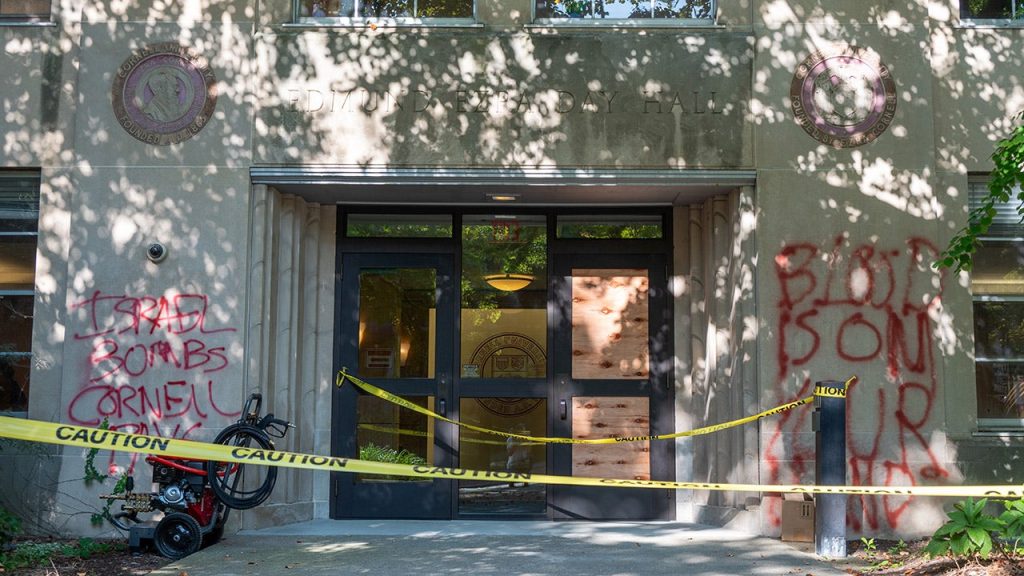Anti-Israel agitators caused chaos at Cornell University in Ithaca, New York, by defacing property, including spraying messages along the entrance of Day Hall and breaking glass. The university’s Vice President for University Relations condemned the actions and promised a thorough investigation that could result in suspension and criminal charges for those responsible. The so-called activists responsible issued a statement justifying their actions as a means to make themselves heard and protest the university’s support for Israel. They criticized former President Martha Pollack for not calling for a cease-fire in Gaza and divestment from Israel, and vowed to escalate their actions for a free Palestine.
Despite administrators’ efforts to prevent a repeat of the chaos from the spring semester, an anti-Israel protest organized by the “Coalition for Mutual Liberation” attracted about 150 demonstrators on the first day of classes. The demonstrators marched from Ho Plaza to Klarman Hall, chanting antisemitic slogans and hanging banners. Police arrived to ask for student IDs for disciplinary action, but one student expressed doubt that effective consequences would be enacted given the response to previous incidents. The student highlighted the lack of arrests following an encampment in the spring term, suggesting that the administration’s fear of potential chaos guided their decisions.
Cornell University’s Interim President and Interim Provost shared specific procedures in place for addressing anti-Israel demonstrations, particularly regarding encampments on campus. For registered encampments, the university aims to provide access to prominent locations to minimize disruption. Unregistered protests will be met with progressive interim measures, such as temporary academic suspensions for violations of university policies. The administrators stressed the commitment to supporting free expression and civil discourse while maintaining a safe and inclusive learning environment free of discrimination or harassment.
The administrators made it clear that while peaceful protests that do not comply with regulations will receive warnings and potential sanctions, acts of violence, property damage, or extended occupation of buildings will not be tolerated and will prompt immediate public safety response. They emphasized the importance of enforcing regulations consistently, regardless of the issue or subject of the protests. The administrators emphasized that their response to any protests on campus would be guided by their commitment to supporting free expression and civil discourse while ensuring a safe and inclusive learning environment.
The administrators pledged to remain neutral regarding the subject matter of the protests and emphasized the importance of balancing the right to free expression with the need to maintain a campus environment free of harassment and discrimination. They stated that it was their responsibility to enforce policies ensuring that speech or actions by some members of the community do not violate the rights of others. In aligning with federal law requirements, they emphasized the need for their administrative actions to be consistent and content neutral. As the campus may become a focal point for protests, the administrators reiterated their commitment to upholding free expression while enforcing policies to protect the rights of all members of the community.


